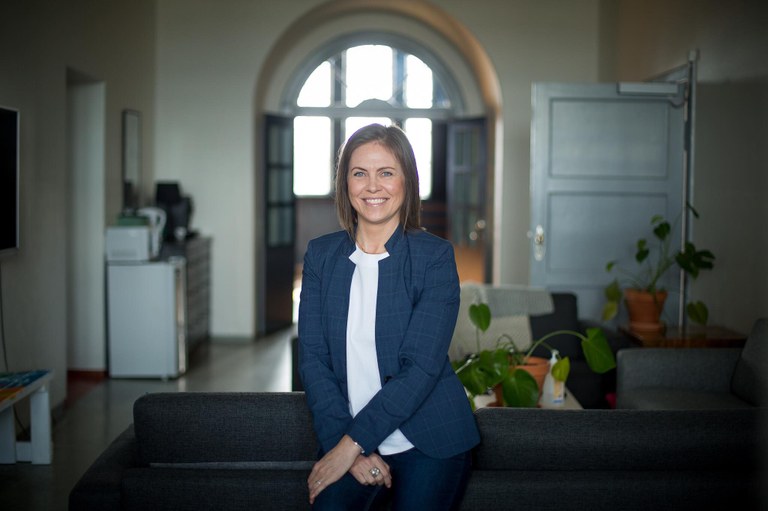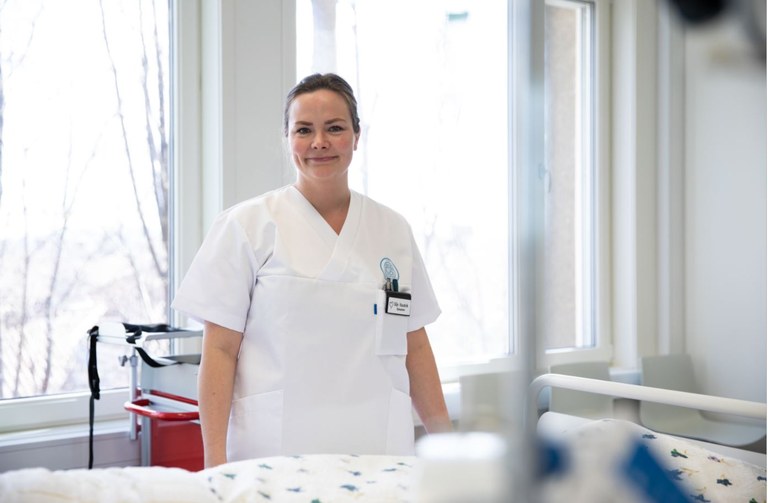Sexual harassment: new knowledge needed
Sexual harassment in the care sector has had less attention than harassment in other sectors. Patients behaving inappropriately is often seen as part of the job. “High tolerance levels represent a problem,” says Bryndis Elfa Valdemarsdottir, who has been heading the Icelandic part of a Nordic project looking at this problem.
Sexual harassment has been a central theme since the #Metoo campaign that kicked off in 2017. A Nordic research project on sexual harassment in the care sector was carried out between 2018 and 2020 and included workers in Akureyri in Iceland, Arendal in Norway and Eskilstuna in Sweden. Nordic Information on Gender (NIKK) has also made a summary of current Nordic research in the area.
NIKK and NIVA organised a webinar on sexual harassment in March, where Bryndis Elfa Valdemarsdottir was one of the participants.
A review of accounts of sexual harassment in order to assess the extent of the problem throws up different numbers. Some recent national studies show 10 to 20% of staff have experienced sexual harassment in the past one to three years.
More assaults in physical occupations
The compilation of research that forms the basis for the report “Sexual harassment at work” also shows that young women are highly overrepresented, along with people with an immigrant background and within certain occupations:
Actors need to use their entire body in order to carry out their job. This often means work goes beyond normal limits for job relations.
In professional sport, physical contact is normalised. Lines might be overstepped. The perpetrator is most often a coach for a younger athlete.
Jobs in the police and armed forces are characterised by masculine ideals and the number of women is low.
Yet the care sector seems to hold a special position. In one survey of a random selection of just over 1,000 Swedish nurses in 2017, 40% of the female nurses answered that they had been victims of sexual harassment and assault. In 69% of the cases, the perpetrator was a patient, in 33% a colleague and in 26% a boss or superior colleague.
Female nurses had had their breast and genitals groped, were called unpleasant names by patients and were asked to help when patients were masturbating. “A consultant doctor felt my bum,” said one of the responders. “Was offered sex with the consultant while I was a student nurse, in exchange for a good report,” said another.
The health can care sector is dominated by women and characterised by intimate care work – for instance helping people wash and get dressed. While there is near parity between men and women doctors, there are far more female nurses than male.
In Iceland only 2% of nurses are men, in Denmark there are 3,5% and in Sweden 9%. The division is equally lump-sided among assistant nurses. According to Statistics Sweden, 91% of assistant nurses working with home visits and in care homes are women.
Many different perpetrators
Perpetrators in the care sector might be colleagues, superiors, patients or family or patients. One of the largest obstacles to fixing the problem is how the harassment is being normalised, especially in relation to patients.
“High tolerance levels in this sector is a real problem. Sexual harassment from patients is considered to be part of the job, and explains why so few of these events are reported,” says Bryndis Elfa Valdemarsdottir, who is the gender equality advisor in the town of Akureyri and responsible for the Icelandic part of the Nordic project.

Bryndís Elfa Valdemarsdóttir, Gender Equality Advisor in Akureyri municipality.
“You are expected to be professional enough to handle harassment from patients. Everyone has the right to healthcare and those who feel uncomfortable or get scared are told they must remain professional. ‘The customer is always right',” says Silje Naustvik, Deputy President of the Norwegian Nurses Federation NSF.
On a collision course with their professional role
“If you can’t handle the harassment, you are perceived as not being professional enough. But we have to stop looking at it like this. Care staff should not have to accept coming home to patients who are watching porn all the time, or put up with sexual comments,” she says.
At the same time, we cannot do what they do in restaurants and throw the guests out if they do not behave. We cannot just throw the patients out, she points out.

Silje Naustvik, Deputy President of the Norwegian Nurses Federation NSF. Photo: NSF
Bryndis Elfa Valdemarsdottir has worked with leaders in the public sector on work environment issues and competence raising in their work on gender equality and non-discrimination.
“We need to create a workplace culture where problems can be raised and silence prevented,” she says.
“That is why the title of our information material and our posters is ‘Let’s talk!’”
So far, 800 people have been participating in courses that have been developed in Iceland and Norway. In Akureyri, they have been focusing on explaining the consequences sexual harassment has for individuals and for society as a whole. Personnel are given practical tools to use to prevent harassment. There are six measures which workplaces can implement:
- Identify and map the risk factors
- Establish rules how to communicate mong the employees
- Have clear routines for how notifications are treated.
- Make a plan for how notifications should be answered.
- Explain the responsibilities of the boss.
- Talk together.
At the end of the day, everyone is responsible for fighting harassment.
“The boss has a big responsibility and most safeguard a healthy work environment, address issues that arise, inform staff and create a good team spirit allowing workers to thrive in the workplace. But all staff are also responsible for reporting any problems and to take action when situations arise,” says Bryndis Elfa Valdemarsdottir and ends with the encouragement:
“Let’s talk about sexual harassment!"
- More money for research
-
After mapping Nordic research on sexual harassment, the Nordic Council of Ministers will go further and support a research project which will lift this up to a Nordic level. A total of 3.7 million Danish kroner (€497.000) will be distributed.
 Follow us on Facebook
Follow us on Facebook
